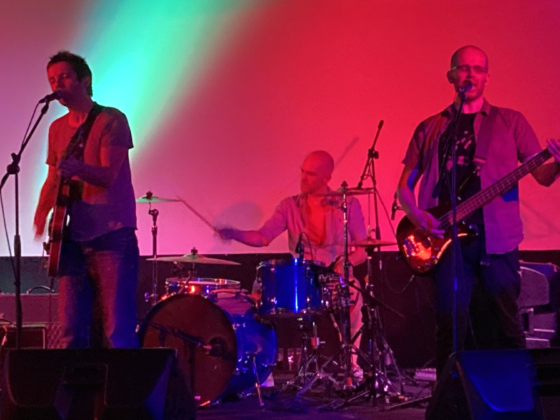This album was released by Constellation Records back in 2011, and although here on EARMILK we're not really on the business of reviewing older albums, the staff thought it was well worth a review when I presented them the album. And if they already thought that on first listen, imagine how I feel about this: Colin Stetson's New History Warfare Vol. 2: Judges was, to me, the best album of 2011, with a large advantage. And I'm pretty sure that in 8 years from now, when the best-of-the-decade lists start to pop up, this album will enter mine. Like a certain kind of film, music like this doesn't come out very often – it's extremely rare. (And what a year 2011 was when you come to think that films like Melancholia and music like this came out during its course. I'll tell one thing: I was fucking glad.)
As you'll be able to tell reading the rest of this – if you do so – I also think that this has already entered the pantheon of jazz greatest releases. Call me crazy. Then listen to the album. The review you're about to read was published at the beginning of this year in my personal blog – which no one reads anyway – save some changes. I'm publishing it here because I think it is my best attempt at doing this album written justice.
Even though it's impossible to not write something about an album so inspiring, I'm haunted by the ever-present will of translating this album's merits into words. I'm sure many before me, best able to do what I'll try here, went through similar situations. More than 52 years ago, I'm certain many didn't knew how to describe that album from that other brilliant musician that had just came out and surprised the entire jazz community; same must've happened almost ten years later, when this same musician (or should now I say director?) released an album that Lester Bangs described as "the kind of album that gives you faith in the future of music;" and all subsquent albums released through the next 8 years (yes, I count his live albums, because live his attitude towards music was completely different than on studio, notwithstanding his mastery over it was the same, somehow) under this auteur's leadership surely must've been even harder to deal with.
Miles Davis reinvented jazz so many times it's hard to even think of the genre's name without thinking of him. Adventurous until the day of his demise, the vacuum he left behind is eternal, and that might as well be the reason why some claim jazz had the same destiny of its greatest creator. I like to think that if he heard that assertion and then listened to what jazz has produced since, especially on the 21st century, he'd have to laugh at the stupidity of those people. Colin Stetson being among those that would receive his praise.
So, if others, infinitely more capable men, couldn't easily, if at all, describe this jazz legend's best moments, don't expect me to make justice to this chapter of New History Warfare, when it sits alongside those moments in terms of greatness – no one gets away with saying that about a recent album, but if there's one for which I will take the bullet, it is this. Like Miles Davis did in the moments I cited, Colin Stetson has mastered his music and achieved the perfect balance between all its aspects. While not sounding like the other at any time – and not only because they play different instruments – Miles' and Colin's music has a lot in common.
Obviously I'm not saying Miles and Colin are at the same level of importance, neither I'm asserting that Colin is the first to do what he did here – obviously, obviously, obviously. What is on the same level here is the music Colin Stetson has created. At its surface it's visceral, ancient and primitive, older than time itself, marshalling the listerner's mind through landscapes lost in time, to the tree of life. Brilliant by achieving such a result through the complexly cerebral overlapping of sound layers; on its innards Stetson's music is spacious, surrounding listeners with its otherworldly immensity, taking them on a space odyssey. Eternal music, that draws from the most varied influences of the past – which I don't dare to put in a list, given how absent of several things that would surely be, since I'm far from knowing enough about music to recognize all that Stetson has filtred through this record – but that isn't an attempt at sounding futuristic, ahead of its time. New History Warfare Vol. 2: Judges is ahead, behind and with all times.
A suggestion: jump this paragraph. When you finish the album, come back to it. 'Cause to the surprise of many, this album was recorded almost entirely live in single takes by 20 microphones positioned at different distances throughout the recording room, this was brilliantly produced and mixed by Stetson himself, with Shahzad Ismaily and Ben Frost, respectively, using the various mic signals as raw tracks to be later assembled, forming the songs. And it feels almost deem of punishment to tell how such musical imagery was produced, but the music is too powerful, anyway, to have any of its qualities disrupted by that. Going by chronology, the most recently released album to speak to me with such strength is from 2002 (coincidentally, on Constellation Records too, so my props to the label).
I can't even single out moments and try to describe them here. How wonderful is the foghorn opening of "Awake on Foreign Shores" when you remember it from the first time you've heard the album, and didn't knew what to expect at that time? And then, when you already know how perfect it all is, but still yearn for new discoveries, which are sure to take place. The divine pairing of "All the Days I've Missed You (ILAIJ I)" with "From No Part of Me Could I Summon a Voice" is so emotionally charged, so visual, that even after several times, I'm always on the verge of breaking down into tears when I listen to it.
Music's power of abstraction allows New History Warfare Vol. 2: Judges to transcend cinematic comparisions. Its level is that of the finest art man can produce, be it film, music, painting, or any other; it succeds in having it all within' itself. How much drama isn't contained on the brief choir on "All the Colors Bleached to White (ILAIJ II)?" Or how many settings aren't to be realized among "Red Horse (Judges ll)" syncopation? How there cannot be paintings of uttermost strength into Laurie Anderson narration and Colin's spiralled playing on "A Dream of Water? I wish I could say that there's a director of photography behind "The Righteous Wrath of an Honorable Man." But there isn't, this all comes from a man and his horn.
Much like the greatest jazz legend.
- New History Warfare Vol. 2: Judges at Boomkat
- New History Warfare Vol. 2: Judges at iTunes
- New History Warfare Vol.2: Judges at Constellation Records (jn FLAC, which I strongly suggest if you have good listening equipment.)
- Colin Stetson's site
Don't forget to check Those Who Didn't Run, Colin's EP also from 2011 consisted of two cuts as good as his latest album material, and New History Warfare Volume 1, from 2009, which, if – obviously – not as good as his more recent stuff, still is head and shoulders above most music you see around and by no means not worthy of praise.











